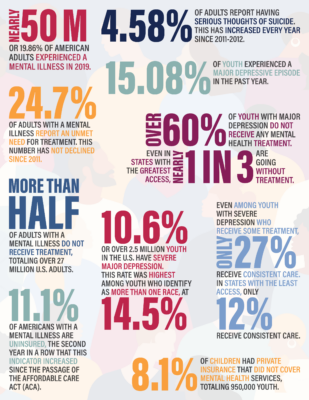The Colorado News Collaborative (COLab) of which Ark Valley Voice (AVV) is a member has quietly been preparing an in-depth look at the state’s mental health situation; a topic it began to explore during the COVID-19 pandemic under the in-depth category “ON Edge”.
On Thursday. our COLab partner, NBC affiliate 9News, ran a special news story about the state’s national standing on it’s administration of mental health support resources, based on new statistics complied by Mental Health America. The news is not pretty.
Colorado ranks dead last – 51 behind the other 49 states and the District of Columbia, in adults with a higher prevalence of mental illness and at the same time, lower rates of access to care.

Featured image: a graphic of national statistics for the latest Mental Health America Audit: https://www.mhanational.org/issues/2022/mental-health-america-adult-data.
The seven measures that make up the Adult Ranking include:
Adults with Any Mental Illness (AMI)
Adults with Substance Use Disorder in the Past Year
Adults with Serious Thoughts of Suicide
Adults with AMI who Did Not Receive Treatment
Adults with AMI Reporting Unmet Need
Adults with AMI who are Uninsured
Adults with Cognitive Disability Who Could Not See a Doctor Due to Costs
Worse, Colorado ranks 44 out of 51 states and D.C. for adults with serious thoughts of suicide, 50th out of 51 for serious substance use disorder, and 48th out of 50 states and D.C. in its ability to actually meet the mental health needs of resident adults. But at the same time, the state has not scrimped on monies being expended on mental health.
There has been so little oversight over this entire health category. According to COLab contributor Susan Greene who has been leading the ON Edge project, when asked how many tax dollars are going into this system, through Medicaid, Medicare, and private insurance the state answers ‘It’s $ 1.4 Billion’, but can’t tell you where they get that money. It could be said to be a mess.
Most Coloradoan’s don’t realize that the state’s mental health coverage is not a cohesive system: it is made up of 17 mental health regions covered by a patchwork of nonprofit mental health organizations that receive little or no state oversight. In our geographic area, Solvista Health is the nonprofit that is the identified mental health provider.
According to this new data, fully one-quarter of U.S. adults with mental health needs are reporting that they aren’t able to receive the treatment they need. Individuals seeking treatment but still not receiving needed services face the same barriers that contribute to the number of individuals not receiving treatment:
- No insurance or limited coverage of services.
- A shortfall in psychiatrists, and an overall undersized mental health workforce.
- Lack of available treatment types (inpatient treatment, individual therapy, intensive community services).
- A disconnect between primary care systems and behavioral health systems.
- Insufficient finances to cover costs including copays, uncovered treatment types, or when providers do not take insurance.
In the U.S. over half (56 percent) of adults with a mental illness receive no treatment. That is, more than 27 million individuals experiencing a mental illness are going untreated. Here in Colorado, more than half of those suffering from some sort of mental health disorder, including rising levels of anxiety and stress during the COVID-19 pandemic, go untreated: 53.60 percent — which translates to more than half a million Colorado adults (558,000)
When it comes to how the state measures up for the number of youth dealing with substance abuse disorders (alcohol or drugs), Colorado ranks 46 out of 51.
But there is one bright spot. While 60.3 percent of U.S. youth with major depression do not receive any mental health treatment (in fact, even among the states with greatest access for youth, one in every three youth are still not receiving the mental health services they need) Colorado ranks second in the nation for its attempt to give attention to addressing youth mental health needs.
Within the next few weeks, AVV will be participating along with some of our COLab partners in a deeper look at the state’s mental health services.
Featured image: a graphic of national statistics for the latest Mental Health America Audit: https://www.mhanational.org/issues/2022/mental-health-america-adult-data.








Recent Comments